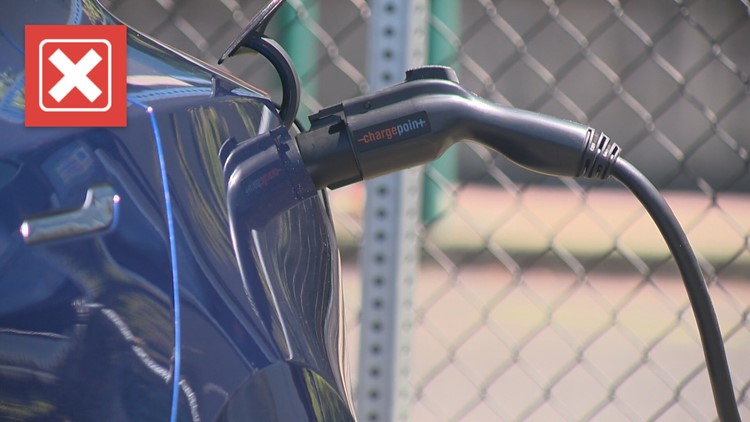PORTLAND, Ore. — Portland General Electric is set to raise residential customer rates by an eye-catching 17% in January, marking a second consecutive year of increases after rates grew by about 7% for residential PGE customers in 2023.
A viewer recently emailed KGW asking how much of that price increase is due to the rise of electric vehicles, referencing a news story from The Street about a recent study from the Texas Public Policy Foundation that found the "true cost" of the electricity used to charge up EV batteries to be the equivalent of $17 per gallon of gasoline for conventional internal combustion engine cars.
That same news story raises some significant caveats about the study's origins and findings, and points to another study that found that electrifying all U.S. vehicles would bring only modest increases in power demand each year. But with Oregon betting big on future EV adoption, it seems reasonable to wonder if heightened demand on the power grid — plus EV subsidies and charger network construction — is playing a role in consumer rate hikes in Oregon.
THE QUESTION
Is a significant portion of PGE's upcoming 17% price hike caused by electric vehicle adoption?
THE SOURCES
THE ANSWER
No, PGE's upcoming price hike is not caused by electric vehicles. The main drivers of the hike are inflation and grid upgrades aimed at resiliency in the face of wildfires and extreme weather.
WHAT WE FOUND
The PGE rate increase didn't come out of nowhere — the utility first floated a 14% increase for 2024 back in February, and the proposal then spent most of the year going through an approval process under the Oregon Public Utility Commission, which ultimately authorized a 17% hike in October.
In a news release at the time, the commission said the increase — technically a pair of increases, one for power supply costs and one for other utility costs — would total up to about $378 million in additional revenue for PGE. It also listed some of the biggest cost drivers behind the rate increase , echoing a similar list in PGE's initial report back in February:
- The Faraday Resiliency and Repowering Project, which replaces a powerhouse on the Clackamas River with a modern earthquake-safe facility.
- Transmission and distribution system resilience and reliability — PGE said it will spent $754.8 million on upgrades between May 2022 and December 2023.
- Increased costs of the vegetation management program.
- Inflation and increased volatility in the western power market.
A separate news release from PGE in October gave a similar explanation, pointing to investments aimed at safety and resiliency during wildfires, heat waves and winter storms and listing examples like new power distribution lines, fire-resistant poles and new remote monitoring systems and weather stations.
Neither news release mentioned electric vehicles as a cost driver, and when asked about EVs specifically, PGE spokeswoman Allison Dobscha said transportation electrification investments account for less than 1% of the cost increase.
The long-term view
PGE does expect electric vehicles to increase the total demand on the grid — referred to as load growth — but that growth will play out over many years, Dobscha said, so PGE is dealing with it through long-term planning rather than any immediate rate increases.
Industrial growth is also expected to increase demand on the grid, and PGE will need to add new resources to keep up with both of those trends. Many of those investments will also be part of the company's shift toward lower-emission energy sources, she said, so it's difficult to tease out a specific portion of those costs that can be attributed solely to EV growth.
The utility is also involved with more immediate transition efforts such as building out EV charging networks, but a lot of the costs of those programs are covered through separate funding sources or by specific and small surcharges on ratepayers rather than large rate increases.
The legislature passed a bill back in 2016 that directed the Oregon Public Utility Commission to work with utilities to develop Transportation Electrification plans, and subsequent legislation in 2021 requires PGE and PacifiCorp to collect a 0.25% monthly meter surcharge to raise funds for transportation electrification programs in underserved communities.
The 2023 edition of PGE's Transportation Electrification plan mentions that the utility plans to spend $96 million on transportation electrification efforts from 2023 to 2025, with about $45 million of that funding coming from the Clean Fuels Program, about $23 million from the monthly meter surcharge and about $18 million from existing customer investment.
That money will go toward programs like Business EV Charging Rebate, which offers rebates to nonresidential PGE customers to help them cover the cost of buying and installing EV chargers in places like businesses and apartment complexes.



